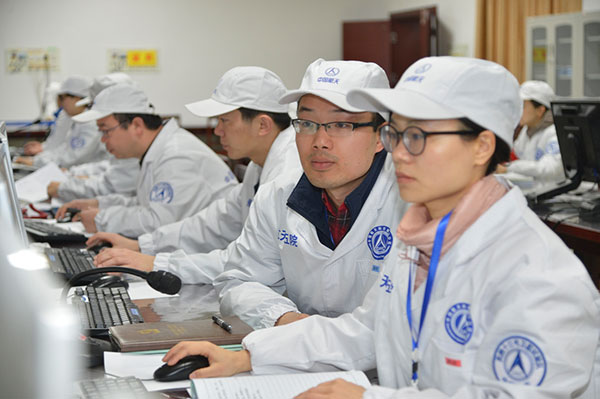China makes headway in race for space technology domination
 |
|
Engineers from the China Academy of Space Technology work on the research and development of Shijian 13, the first Chinese-made high-throughput satellite. [Photo provided to China Daily] |
Satellite communications technology is the crown jewel of China's high-tech development, and it has played a vital role in connecting the country with the rest of the world.
A team of about 500 engineers from the China Academy of Space Technology, with an average age of just 33, forms the backbone of design, research and application for China's satellite communications technology, which is used in commercial and mobile communications, broadcast and data transfer, among many other things.
The team, which was established in 2000 for innovation purposes and is headed by Zhou Zhicheng, has overcome the dominance of overseas technologies and developed the Dong Fang Hong 4 large-scale communications satellite platform in a little more than six years.
The DFH 4 platform marked several breakthroughs-it broke the 15-year operational life limit and the 5-metric-ton mass milestone, and was nearly 20 times more powerful than the previous model, according to the academy.
"It changed everything, meaning China's radio and TV broadcasting sector no longer relied on imported satellites," a spokesperson with the academy said.
One of the team's technological breakthroughs is its electric propulsion technology-an extremely complex piece of technology.
In the United States' bid to achieve such technology, it experienced four failed satellite orbits. The difficulty had prompted Chinese experts to debate over whether to use the technology when the team was developing a new model of the DFH 4 satellite platform. But Zhou insisted that the technology, though controversial, could greatly reduce fuel loads and increase communication capacity.
"An advanced communications satellite must use this technology," he said.
The team managed to overcome technological issues and first tested the system on Shijian 13, the first Chinese-made high-throughput satellite, which was launched on April 12.
With the technology, the Shijian 13 satellite is capable of transmitting 20 gigabytes of data per second, exceeding the total capacity of all of the country's previous communications satellites and making it the most powerful communications satellite the nation has developed.
Since May 2007, 19 satellites using the DFH 4 platform have been successfully launched, leading to the academy's team winning awards, including the First Class National Science and Technology Progress Award-one of China's most prestigious science awards.
The DFH 4 communications satellite platform has also received global recognition, and its in-orbit stability is on a par with US and European satellites, according to the academy spokesperson.
The team has placed seven commercial communications satellites in orbit for countries including Nigeria, Venezuela, Pakistan, Laos and Belarus.
A communications satellite made for Venezuela has connected more than 1,700 education institutes and 214 agriculture infrastructures within two years, according to the academy.
It is expected to lead to the construction of 16,000 ground stations in 10 years and benefit 8 million people in Venezuela.
Another communications satellite delivered for Bolivia has brought annual income of more than $25 million to the country through the leasing of transponders, and is expected to earn more than $500 million during its lifetime, according to the academy.
A satellite made for Laos has brought dozens of TV channels around the world to its population of 7 million, it said. In the 13th Five-Year Plan (2016-20) period, the team will participate in the launch of 25 satellites and be involved in the research of 50 satellites, the academy added.
- Preserving a Chinese icon: Great Wall needs rescue
- Chinese museums receive 900m visitors each year
- Chinese man sentenced over selling wildlife online
- Former senior Jiangsu official sentenced to four years for bribery, illegal foreign exchange purchase
- Police crack down on illegal online animal trade

























